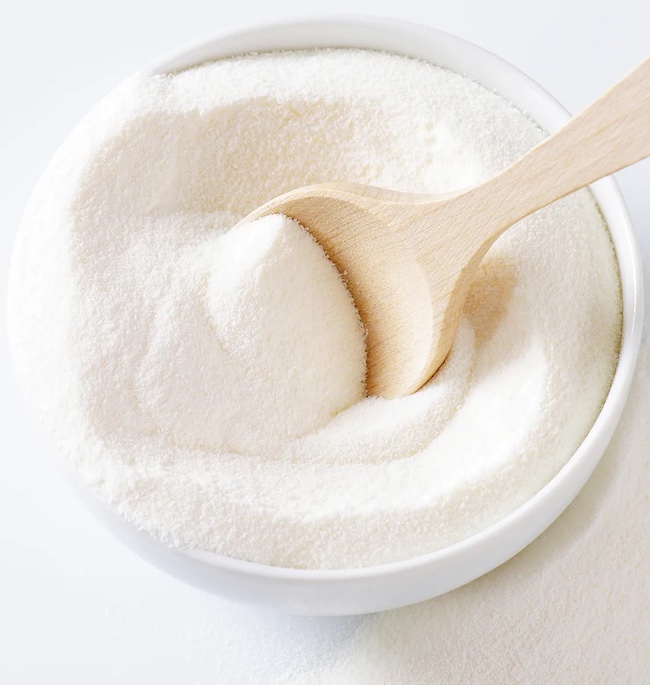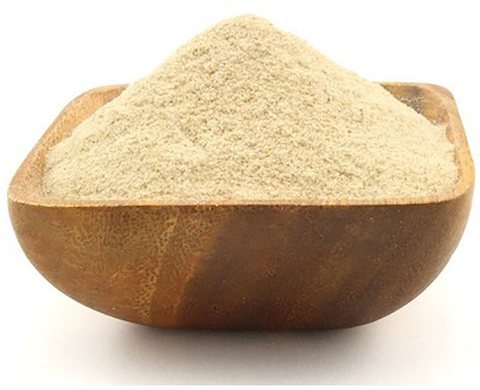People adding stuff to their food for health is not a new concept. Be it fruit, wheat germ, or protein powder, there are a wide variety of products to help people enjoy a healthier lifestyle when they eat. Not all those additives are actually beneficial or useful, and some can even be harmful.

When making use of such products, it’s important to know the benefits, risks, and potential side effects. While not really an issue with extra fruit in your oatmeal, some products have uses beyond just eating. These additives can be found in all sorts of products, whether you realized it or not. Such is the case with Xanthan gum.
Contents
What is Xanthan Gum?

Xanthan gum is a food additive made by adding alcohol to fermentable sugar, letting the resultant goo dry to a solid state, and then powdering the results. This powder is often added to thicken foods, liquid or otherwise. It can also be used to help stabilize products, as Xanthan gum is pretty forgiving of temperature changes and thus tends to remain stable under a wide variety of conditions.
While that might sound odd, it’s basically just a soluble fiber, like the kind found in oats and citrus fruits. Xanthan gum itself has little in the way of nutritional benefit beyond its presence as a fiber and is more often used for the thickening aspect.
For example, it is often found in salad dressings, soups, syrups, and gluten-free products. It also has industrial applications, being found in paints, glues, and household cleaners. Xanthan gum is also used in healthcare products such as toothpaste, lotions, and shampoos.
What are the health benefits?

As a soluble fiber, the health benefits of Xanthan gum are pretty much the same as any food high in the same sort of fiber. Those benefits include lower cholesterol, antioxidants, improved regularity, and potentially, lower blood sugar.
It is because of these health benefits you’re likely to find Xanthan gum as a food supplement to assist with a low-fiber diet, at least when intentionally taken internally. Though a common enough food additive, it is also extremely prevalent in the world of skincare products, as previously noted.
Use in Skincare
Xanthan gum is extremely common in a wide variety of skincare products. As noted before, it’s effectively a thickener, and its use in items such as lotions reflects that. As a thickener and stabilizer, Xanthan gum is pretty forgiving. It can be easily mixed into a wide variety of products and can withstand a pretty far range of temperatures and humidity.
This versatility makes it ideal for a wide range of uses, including skincare products. Even if you have never heard of Xanthan gum before now, you have very likely eaten it, used it in a DIY project, and put it upon your skin or in your hair.
With such a wide range of uses and applications, external and internal, you might be wondering what sort of risks and health concerns arise from using such products. While Xanthan gum is extremely stable, again being effectively powdered fiber, some issues need to be kept in mind with the product, especially if you are using it heavily and intentionally.
Health risks
When used as a probiotic, the most common health issues with Xanthan gum are those related to the bowels. Increased regularity, soft stools, and increased gas are common results. Xanthan gum can also cause problems for people with corn and dairy allergies.
Certain medications can have issues with it, too, since the product improves regularity and gas output. Both can interfere with certain medications, their dosage absorption, and how they are passed.
Risk to the Skin?

With potential problems arising from ingesting a lot of Xanthan gum, you might be worried about the risks of using it on your skin in all those lotions. Fortunately, Xanthan gum shows no side effects when used topically.
Some studies have suggested the potential for Xanthan gum as a moisturizing agent, but testing in this field is not conclusive or thorough. As for possible reactions, it is likely that if you do have a reaction to a product that heavily features Xanthan gum, you’re probably reacting to another product or are allergic to the base product, such as corn.
Such reactions are rare when Xanthan gum is used externally, but people with sensitive skin are well aware of the struggles of managing skincare without breaking out in a rash over seemingly safe and stable products.
Final words
Xanthan gum is powdered fiber. It has notable health benefits, is extremely stable in a variety of conditions, and can be found in a wide swath of products. Not all those products are food, but a lot of them are used for skin care.
While xanthan gum can cause issues in some people, the side effects are often related to its use as a probiotic or due to allergic reactions from the base ingredients used to make the powder. Those who are interested in the use of xanthan gum-based skincare products, but are wary of potential reactions, should feel confident in discussing the matter with a health professional.
This is especially true for those with certain allergies or those taking medications that might not take kindly to products like Yakult, many copycat recipes of which call for the use of products like Xanthan gum.
Xanthan gum itself is generally not a concern for use in skincare, but it can cause digestive issues, and those who are sensitive to such problems are especially encouraged to seek medical advice on the matter, as are those with sensitive skin. Xanthan gum is pretty safe, but every person’s body is different, even when it comes to fiber.





